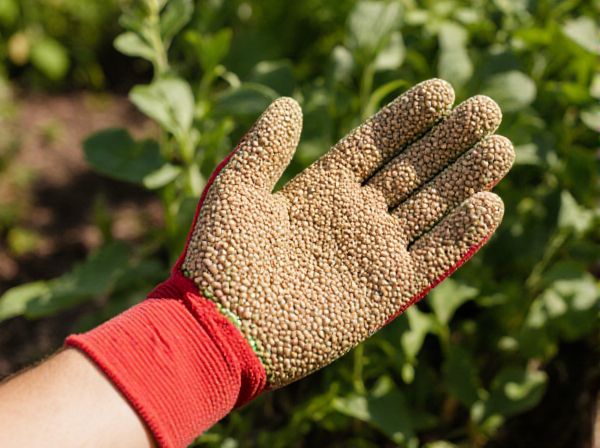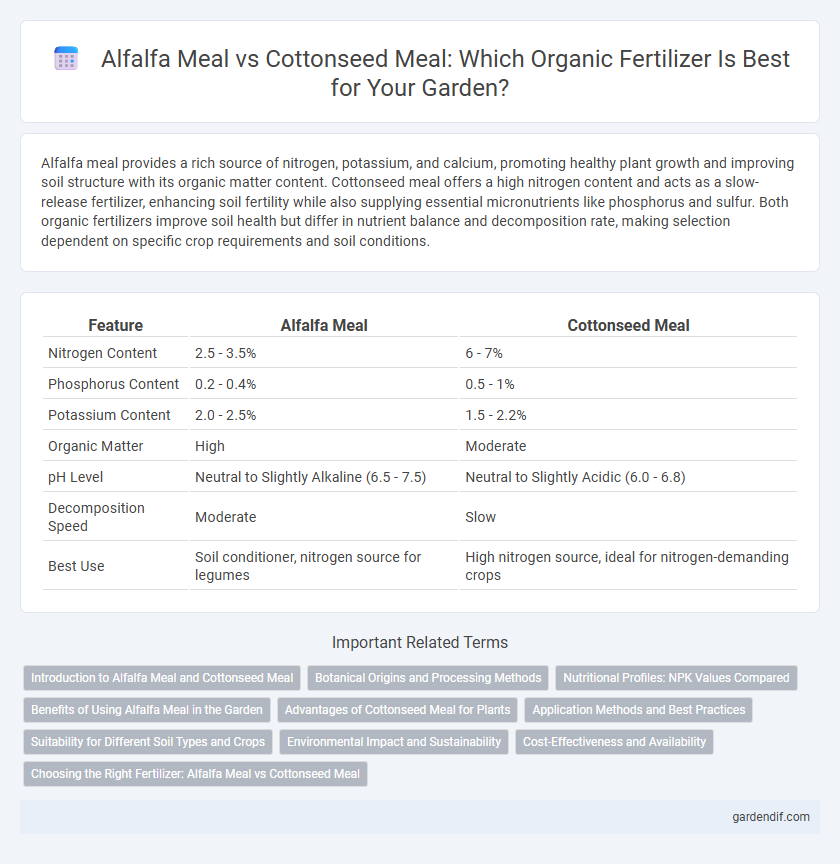
Alfalfa meal vs cottonseed meal Illustration
Alfalfa meal provides a rich source of nitrogen, potassium, and calcium, promoting healthy plant growth and improving soil structure with its organic matter content. Cottonseed meal offers a high nitrogen content and acts as a slow-release fertilizer, enhancing soil fertility while also supplying essential micronutrients like phosphorus and sulfur. Both organic fertilizers improve soil health but differ in nutrient balance and decomposition rate, making selection dependent on specific crop requirements and soil conditions.
Table of Comparison
| Feature | Alfalfa Meal | Cottonseed Meal |
|---|---|---|
| Nitrogen Content | 2.5 - 3.5% | 6 - 7% |
| Phosphorus Content | 0.2 - 0.4% | 0.5 - 1% |
| Potassium Content | 2.0 - 2.5% | 1.5 - 2.2% |
| Organic Matter | High | Moderate |
| pH Level | Neutral to Slightly Alkaline (6.5 - 7.5) | Neutral to Slightly Acidic (6.0 - 6.8) |
| Decomposition Speed | Moderate | Slow |
| Best Use | Soil conditioner, nitrogen source for legumes | High nitrogen source, ideal for nitrogen-demanding crops |
Introduction to Alfalfa Meal and Cottonseed Meal
Alfalfa meal is a natural organic fertilizer rich in nitrogen, calcium, and trace minerals, promoting robust plant growth and improved soil structure. Cottonseed meal, derived from cotton seeds, offers a balanced source of nitrogen and phosphorus, enhancing nutrient availability and soil fertility. Both fertilizers serve as sustainable options to boost crop yields and maintain healthy soil ecosystems.
Botanical Origins and Processing Methods
Alfalfa meal is derived from the Medicago sativa plant, harvested and dried to maintain its nutrient-rich profile, primarily containing nitrogen, potassium, and calcium. Cottonseed meal originates from the seeds of Gossypium species after oil extraction, undergoing a solvent or mechanical pressing process that results in a protein-rich fertilizer high in nitrogen. The distinct botanical origins influence their nutrient compositions, while processing methods affect the bioavailability and suitability for different soil fertility needs.
Nutritional Profiles: NPK Values Compared
Alfalfa meal typically contains an NPK ratio around 2-2-2, providing balanced levels of nitrogen, phosphorus, and potassium ideal for promoting leafy growth and improving soil structure. Cottonseed meal generally offers a higher nitrogen content, approximately 6-2-1, making it more effective for nitrogen-demanding crops while also supplying moderate phosphorus and potassium. Comparing these nutritional profiles helps farmers select the appropriate fertilizer based on crop nutrient requirements and soil fertility goals.
Benefits of Using Alfalfa Meal in the Garden
Alfalfa meal enhances soil fertility by providing a natural source of nitrogen, potassium, and phosphorus essential for plant growth. Its high organic matter content improves soil structure, water retention, and stimulates beneficial microbial activity. Rich in trace minerals and growth stimulants like triacontanol, alfalfa meal promotes vigorous root development and healthier plants compared to cottonseed meal.
Advantages of Cottonseed Meal for Plants
Cottonseed meal offers a rich source of nitrogen, phosphorus, and potassium, promoting robust plant growth and improved soil fertility. Its slow-release properties ensure a steady nutrient supply, reducing the risk of nutrient leaching and supporting sustained plant development. This organic fertilizer also enhances soil structure and microbial activity, contributing to healthier root systems and increased crop yields.
Application Methods and Best Practices
Alfalfa meal is best applied as a top-dressing around established plants or mixed into the soil pre-planting to enhance nitrogen levels and improve soil structure. Cottonseed meal works effectively as a slow-release nitrogen source when incorporated into the soil before planting or used in side-dressing applications during the growing season. Proper application rates depend on crop type and soil nutrient status, with soil testing recommended to optimize fertilizer efficiency and avoid nutrient imbalances.
Suitability for Different Soil Types and Crops
Alfalfa meal is highly suitable for acidic to neutral soils and benefits nitrogen-loving crops like vegetables and legumes due to its balanced nutrient profile and slow-release nitrogen content. Cottonseed meal performs well in alkaline to neutral soils and is ideal for acid-loving plants such as blueberries and azaleas, providing a steady supply of nitrogen and organic matter. Both fertilizers improve soil structure but require consideration of pH compatibility and crop nutrient demands for optimal results.
Environmental Impact and Sustainability
Alfalfa meal offers a more sustainable fertilizer option due to its renewable crop source and low environmental footprint, promoting soil health with minimal chemical inputs. Cottonseed meal, while rich in nitrogen, often involves pesticide-intensive cotton cultivation, raising concerns about soil degradation and water contamination. Choosing alfalfa meal supports eco-friendly farming practices by enhancing carbon sequestration and reducing reliance on synthetic fertilizers.
Cost-Effectiveness and Availability
Alfalfa meal generally offers higher nutrient density with rich nitrogen content, making it a cost-effective choice for sustainable fertilization, though it tends to be pricier and less widely available than cottonseed meal. Cottonseed meal provides a more affordable and readily accessible nitrogen source, especially in regions with cotton production, but its lower nutrient concentration may require larger application rates to achieve similar results. Farmers often balance cost-effectiveness with availability by choosing cottonseed meal for budget constraints and alfalfa meal for enhanced soil enrichment and long-term fertility.
Choosing the Right Fertilizer: Alfalfa Meal vs Cottonseed Meal
Alfalfa meal is rich in nitrogen, potassium, and calcium, promoting vigorous plant growth and improving soil structure, while cottonseed meal offers a slower nitrogen release and contains essential micronutrients like phosphorus and magnesium. Choosing between alfalfa meal and cottonseed meal depends on your soil nutrient needs and plant requirements, with alfalfa ideal for nitrogen-hungry crops and cottonseed beneficial for long-term soil fertility. Both organic fertilizers enhance microbial activity and soil health but vary in nutrient release rates and specific nutrient profiles, influencing crop yield and soil sustainability.
Alfalfa meal vs cottonseed meal Infographic

 gardendif.com
gardendif.com